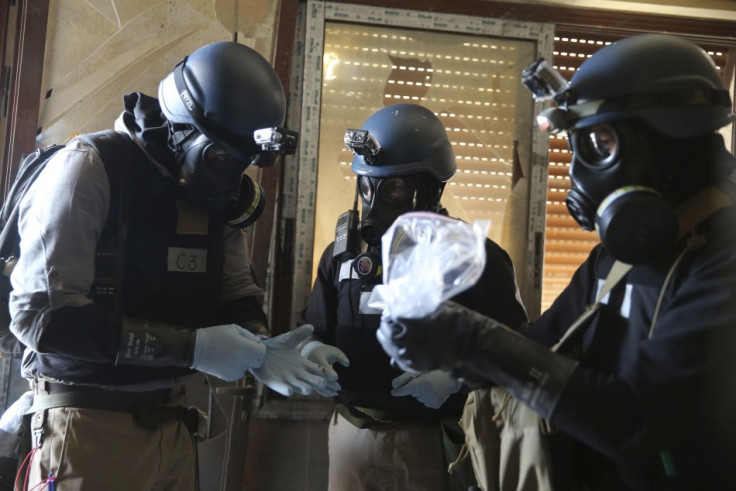Syria: UN Ghouta Gas Attack Report Changes Nothing

On 21 August 2013, an estimated 1,400 people (American assessment) including some 600 children in the area of Ghouta, Syria, in the suburbs of Damascus, were killed by chemical weapons. The belief, particularly strongly held by the governments of the United States, Great Britain and France, was and remains, that the only forces capable of manufacturing, mixing the toxic ingredients, weaponizing and delivering them in the current civil war in Syria, were those of the Syrian Government under its President Bashar al-Assad.
Speaking to two CNN news reporters shortly after the event, President Obama told them:
"...Nobody disputes, or hardly anybody disputes, that chemical weapons were used on a large scale in Syria against civilian populations. We have looked at all the evidence and we do not believe the opposition possessed...chemical weapons of that sort. We do not believe that given the delivery systems using rockets, that the opposition could have carried out these attacks. We have concluded that the Syrian Government, carried out the attack and if that's so there needs to be international consequences..."
It is interesting to note how carefully President Obama chose his words of condemnation. Some, notably Syria's major military backer Russia, have condemned even the threat of armed intervention, even when limited to the degrading or destruction of Syria's chemical arsenal.
Syria possesses about a thousand tonnes of weapons grade materiel, including hundreds of tonnes of sarin, which it admitted to having in 2012 and has never been a signatory to the Chemical Weapons Convention - although it promises to do so in the near future.
Russia's stance is to accept that these weapons have been used but that there is no conclusive proof, especially in the case of Ghouta, as to who actually fired them. They also believe or choose to accept President Assad when he claims that he has never authorised their use and some foreign intelligence services say that there is evidence that he has always refused any requests made by his military for their deployment.
The inference therefore is that the chemical weapons have apparently fallen into the hands of terrorists amongst the opposition who have used them as a plant in order to provoke an armed response from the West.
This is not inconceivable as, to date, an estimated 70,000 Syrian soldiers have defected to the rebel side and a number of these could well have the knowhow in chemical warfare to launch a strike. Yet President Obama, whilst not denying that elements within the rebel forces might possess chemical weapons and may have used them during the civil war, in reference to Ghouta, was too much to credit.
Factors supporting America's position included the sophistication and scale of the attack, almost certainly launched from the direction of known Government-held positions and in ideal weather conditions for a gas warfare assault, was too complex for a relatively disjointed opposition to carry out. There was also the not insignificant detail that none of the Government's supporters had been harmed.
On 16 September, the eagerly awaited United Nations report into the Ghouta chemical weapons attack was delivered to the Security Council. It was, to the regret of many, something of an anti-climax revealing little more detail than has already been in the public domain since the world witnessed images of the dead and dying, those foaming at the mouth and convulsing as they choked on their own vomit on that late August day.
No doubt because it wasn't allowed to, the all-important question of where the blame should squarely be placed, was not answered.
Secretary-General of the UN, Ban Ki-moon condemned the action as strongly as he could without naming the guilty and stated unequivocally, "This is a war crime," and continued:
"Survivors reported that following an attack with shelling, they quickly experienced a range of symptoms, including shortness of breath, disorientation, eye irritation, blurred vision, nausea, vomiting and general weakness".
That last piece politely covers other nasty effects and Mr Ban added that 85 per cent of the blood samples tested proved positive for sarin.
Continuing his report, he went on to name three areas in particular which had been hit saying that the delivery vehicle was a variant of the M14 artillery rocket, "fired from an unspecified region to the north-west". (Coincidentally, though the Secretary-General was sufficiently tactful not to mention it, that's where the Syrian Government forces are).
And for good measure, Samantha Power, the US Ambassador to the UN, was quoted by the Financial Times on 17 September saying: "...the technical details of the UN report make clear that only the regime could have carried out this large-scale chemical weapons attack...".
Ms Power reinforced this standpoint by indicating that after studying "thousands of open source videos", the opposition forces have never been seen to use M14 rockets with 140mm and 330mm calibres.
Sadly, not even willing to concede an inch, Ms Power's counterpart at the UN, Vitaly Churkin, was standing behind Moscow's position that some governments were "jumping to conclusions" and, "We cannot shrug off allegations that the opposition used chemical weapons".
Mr Churkin made reference to a chemical weapons attack near Aleppo on 19 March which Russia asserts was carried out by rebel forces and wants a UN inspection team to investigate.
As the big powers score political points off each other, countless millions throughout Syria are suffering.
© Copyright IBTimes 2025. All rights reserved.






















